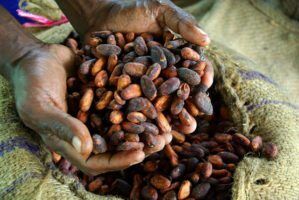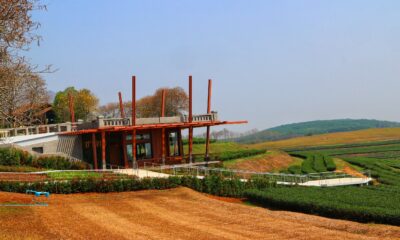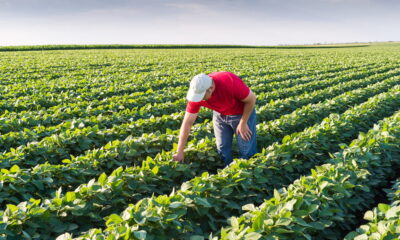

News
Ivorian Cocoa Farmer Appeals To London Chocolate Forum For More Involvement
Delegates at the London Chocolate Forum were address today (October 7) by Ivorian cocoa farmer, Fortin Bley, who warned that without an increase in efforts to involve farmer a whole generation of growers may be lost.
Sharing the experience of cocoa farmers, at the conference as the 2016 cocoa harvest officially gets under way, and just ahead of Chocolate Week (10-16 October), the UK’s biggest chocolate celebration, he said:
“Behind every house made of mud is real hardship. If you want to continue consuming chocolate, we all need to have a common vision. Ask us what we need, and we’ll talk to you, and we’ll take a decision together. That’s why we’ve chosen voluntarily, without any pressure, to migrate into Fairtrade certification, because we know they have human values, transparency and democracy.
“For us, the FAIRTRADE Mark represents a dignified producer. So, if you really want to change the life of producers, work in partnership with us, and you’ll make us happy.”
If you want to continue consuming chocolate, we all need to have a common vision. Ask us what we need, and we’ll talk to you, and we’ll take a decision together.
He said that cocoa communities urgently need development, especially in West Africa, where many live on $2 a day or less. Farming communities continue to be blighted by child labour, and lack the essential services such as clean water, decent homes with electricity, adequate healthcare and education that most of us take for granted.
“Are we proud to see producers living like that? Do you think they can produce cocoa living this life? We need to change things. That’s why it’s so important for me to show you how cocoa is actually produced,” he told the room. He warned that farmers’ children see no future in cocoa and continue to switch to more profitable crops or head for the cities in the hope of finding a more dependable livelihood. As a result, the average age of cocoa farmers in West Africa is now 51.
These factors add up to serious concerns across the industry about the long-term sustainability of the supply chain: no cocoa farmers = no chocolate. As a result, the $150bn global chocolate industry is facing a watershed moment as demand for cocoa is increasing, but farmers are ever more vulnerable to shocks caused by climate change and extreme poverty.
Jon Walker, Cocoa Supply Chain Manager at the Fairtrade Foundation said:
“It’s simply wrong that cocoa farmers who grow one of our most indulgent treats are going hungry themselves. The cocoa industry should be the envy of other markets, with demand for its products growing year on year, as more and more people around the world can afford to indulge their taste for chocolate, but cocoa farmers must be empowered to reach a living income for a truly sustainable chocolate industry.
“Fairtrade supports empowerment of cocoa farmers. Many have turned to Fairtrade to address key social and environmental challenges. We’d like to work with more businesses to drive through long lasting, impactful change so farmers can decide their own futures.”
In recent years, global companies have increased investment in strategies to improve productivity and ensure their supply of cocoa, as well as in sustainability issues related to child labour, youth protection and climate change. But any intervention should also enable farmers to move to more sustainable production that addresses economic, social and environmental challenges.
Uniquely, Fairtrade empowers farmers to meet these challenges. Fairtrade Standards provide a framework for cocoa farmers to increase their incomes and reduce poverty – by forming or strengthening existing democratic organisations, farmers can improve their business systems, access new markets and develop long-term trading partnerships. And the Fairtrade Premium can be invested in providing training in modern, sustainable farming techniques to improve cocoa quality and productivity, as well as in financing projects to improve community healthcare, education and infrastructure.
Fortin Bley is a cocoa farmer, Secretary General of his co-operative CANN, and chair of the Fairtrade West Africa Producer Network.


 Environment12 months ago
Environment12 months agoAre Polymer Banknotes: an Eco-Friendly Trend or a Groundswell?

 Features11 months ago
Features11 months agoEco-Friendly Cryptocurrencies: Sustainable Investment Choices

 Features12 months ago
Features12 months agoEco-Friendly Crypto Traders Must Find the Right Exchange

 Energy11 months ago
Energy11 months agoThe Growing Role of Solar Panels in Ireland’s Energy Future





























